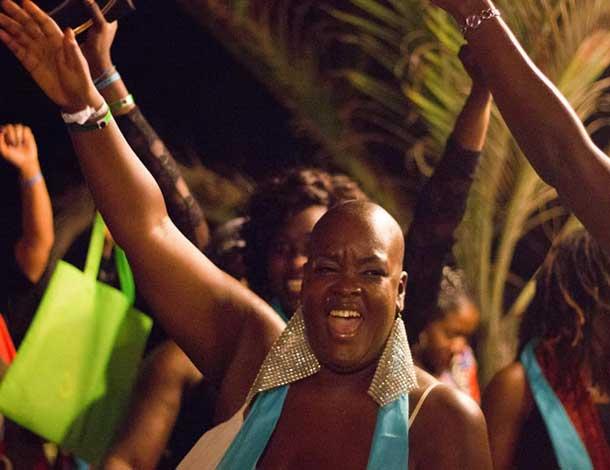“Traditionally underrepresented or marginalized communities will have a strong presence at the Forum, some of them are: Young feminist activists; Black and Afro-descendant women; Indigenous women; Sex workers; Women with disabilities; Trans* and Intersex activists; and migrant activists.”
-13th AWID Forum Call for Proposals
In an Uber drive from breath-taking sightseeing in Pelourinho, my new travel buddy and fellow intrepid explorer Lucy sleepily said “I have never been to a space with so many openly out lesbians.”
“Really?”, I asked her, a bit surprised by this realisation. Because I work for the Coalition of African Lesbians (CAL), I am fortunate to be consistently privy to many such spaces where queer and lesbian women are visibly present. But I then take for granted the fact that in many other spaces, queer and especially black women are either completely absent from important spaces and conversations, or we remain quiet in these spaces, unsure of whether it is safe enough for us to be queer in that space. Or sometimes to even be women.
That’s why, when I read that the AWID Forum had taken deliberate care to ensure that as much as possible, all women, of all bodies, politics, minds, passions, abilities and representations would be present, I was thrilled. I was excited to be in a space where conversations between women living with disabilities and women in the front-lines of the Black Lives Matter movement could have conversations that bridge the gaps we experience so often in our lives and work.
The Black Feminisms Forum even created this space, and a panel titled Rights and Justice for African Women with Disabilities: A triple battle was held.

Only problem is that we didn’t show up for this. Many of us didn’t think that this was our issue - and we went off to find ‘our’ issues. Once again, in a space filled with so much passion and revolutionary love, women living with disabilities found themselves among themselves, and us, nowhere to be found.
I was thirty minutes late for this panel, which I had decided to attend after listening in on a webinar that was collectively hosted by AWID, Resurj, CREA and CAL. Titled Bridging Gaps: A Conversation between Disability, Intersex and Trans Activists, this conversation sparked a desire for understanding how our work and our oppressions really intersect, and not just on an ideological level, but in our everyday lives and our ever changing bodies. In this webinar, Janet Price, an activist and academic working at the intersection of disability, sexuality and gender, spoke of the transformation of her body and politics over the years, first as a feminist, then as a queer woman, then as a queer feminist living with disability. She made me realise that the gross error of silos in our social justice work is the lie that ‘our’ issues are a permanent state of being, while the nature of our bodies and world we live in mean that these issues are always in flux, and that much as sexuality must be an important conversation to be had by people living with disability, so must living with disability be a key and core conversation that queer and trans* people have.
Because of this, I was made aware of my body, my queer body and the question of where this body would fit in, if I were to become a woman living with a disability. During the Bodily Integrity and Freedom Umbrella Session at the AWID Forum, Janet spoke of her own experience and gradual exclusion from the queer community where she’d initially found a lot of belonging. As a woman using a wheelchair, many of her friends’ homes became inaccessible, and many queer people in her space didn’t know how to make room for a queer woman, who had now become a queer woman living with a disability. This made me think of my own home-on the second floor of a four storey building-would I be able to access my home, but also that should I make friends that live with disabilities, I also wouldn’t know how to get them into my home for a visit.
The truth is, within the queer community there aren’t enough conversations or attempts to have conversations that include people who are non-conforming to heteronormativity and gender binaries that are also people living with disabilities. Interestingly, Janet offers, people working on sexuality and gender rights have a lot to offer the movements with and for people living with disabilities by way of conversations about sex, sexuality and sensuality. There is so much to gain from truly allowing our work to intersect, and recognise that these intersections lie in our own bodies and lives.
As I sat through the last conversations of this panel, in a room big enough for over one hundred people, I counted only 16 people, including myself. We can try harder, we must try harder to take our work beyond representation. It’s not enough to have the right number of ‘minorities’ in a room, if we are not having the conversations that need to be had. It’s not enough to have a group of queer women in a space if we can only talk among ourselves.
About the author
Sheena Magenya is the Media Specialist at the Coalition of African Lesbians (CAL). She is a feminist, a woman, and passionate about conversations that ask the unasked questions, and that imagine radical change.
2224x1253.jpg)